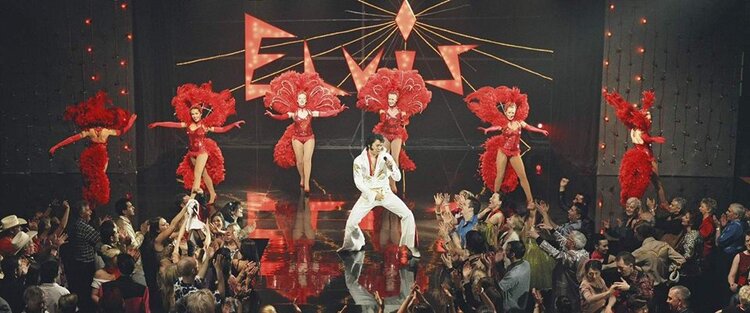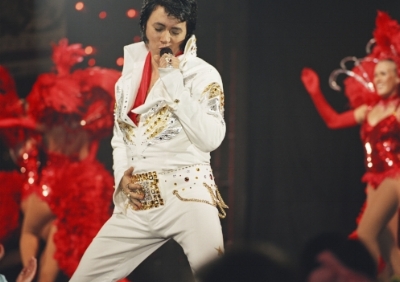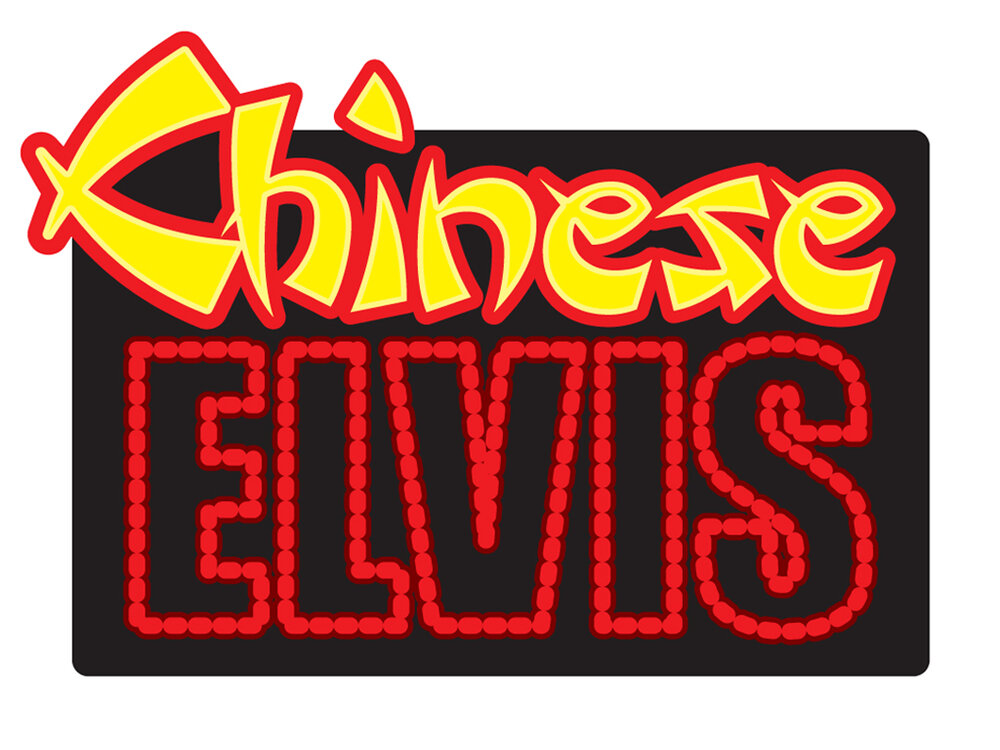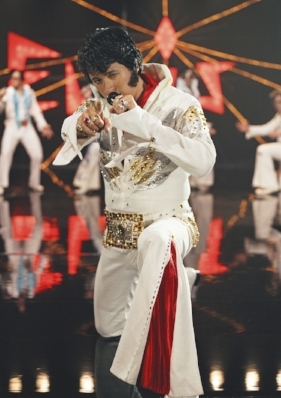Introduction
Paul Courtenay Hyu, a British/Chinese actor, writer and director, first came to my attention while doing research for my article “Elvis, ETAs and Humour”. Paul, aka ChineseElvis, reached a wide audience when he appeared on the UK game show The Weakest Link Elvis Special. Paul was the winning contestant from a panel of nine that included ETAs Gino Monopoli from Canada, Oliver Steinfhoff from Germany, and Gordon Hendricks from Great Britain. When I mentioned Paul’s name to Gino, who came a close second to Paul, he said he had pleasant memories of their appearances together on Weakest Link. Paul remembers helping Oliver with his understanding of the rules of the game since Oliver had some trouble with the English translation. One of Paul’s many talents is that he speaks fluent German. Paul’s list of credits over the past years, which includes work in film, television, theatre and radio drama, is impressive. A complete list of Paul’s body of work can be found on https://en.wikipedia.org/wiki/Paul_Courtenay_Hyu
I was pleased when Paul agreed to be featured in SPOTLIGHT ON. As might be expected from someone with such an illustrious career in entertainment, Paul has some interesting perspectives on his work in show business as ChineseElvis and as an actor . He is also forthright in his opinions and stories about ETA land and life in general. I welcome Paul Hyu to SIDEBURNS Magazine. Thank you, Paul, for your interesting and candid answers to my interview questions. Best regards, Carolyn.
The Interview
Q. Tell us five interesting things about your childhood.
A. I was born in London. My dad was a hospital doctor and I used to play in the hospital, running up and down the corridors with other doctors' children. This would never happen nowadays. I moved to Germany with my family when I was 9. I went to a boarding school in North England when I was 11. I was very bright, and top of my class.
Q. Describe your life as a teenager.
A. At boarding school I was a keen but average sports player, being good at table tennis and badminton, but less good at cricket and rugby, the main sports. I was on the school’s debating team and in the choir, and acted in school plays. I won the school’s drama prize as well as the German prize. I didn’t study German for A level, though, instead studying Math, Physics and Chemistry. In my final year I ended up as Head of House, which was a coup in those days for a non-white boy. I was offered a place to study medicine at Bart’s, a famous teaching hospital in London, which happens to be where I was born.
Q. What did you do with your time after your high school years ended?
A. Instead of medicine, I chose to do a Physics degree in Leeds at the university. In the meantime, while waiting for exam results, I played the lead role in a school musical, which we performed in Berlin to great acclaim. The Prime Minister at the time, Margaret Thatcher, sent us a note of congratulations for representing the country so well at this 40th anniversary of the end of the war festival. It was 1985 and I started thinking I should be an actor.
Q. What career path did you decide to take after high school?
A. I spurned my place at Med school and went to university for a term, studying Physics with Psychology as a subsidiary. I went to visit a friend of mine from school, Tim, who, himself, had gotten into drama school. I loved what I saw so much I decided to audition forthwith and quit 'uni', much to my parents’ bemusement. They had never once taken me (or themselves) to the theatre. We knew no actors, and it all seemed a bit extraordinary and chaotic and unplanned.
Q. Did you take any lessons related to the performing arts? Please explain.
A. I got a diploma in classical acting from the London Theatre School after 2.5 years. During that time, I won the school’s prize fight competition as Cato fighting Inspector Clouseau (played by Chris Chaplin, son of Charlie), and was head of the students' union. All I did for that entire time was live and breathe theatre--acting, voice, plays, Shakespeare, singing, and my favourite, stage fight.
Q. What music was most often heard in your home?
A. Pop music was always being played at school and when I was at home, my parents would play Elvis / Andy Williams / The Carpenters as well. We had a lot of access to music. My dad had a reel to reel tape and we had a room with a keyboard where we could listen to records and play along.
Q. Were you a performer prior to becoming an ETA? In what capacity?
A. I became a professional actor in 1988, getting my sought-after Equity Card in 1989. It was hard to get one in those days and I am proud of my number, being as it shows I got in before they changed the rules and opened up the membership. I first worked in Germany on tour and at the German national theatre in Hamburg. Then I landed good parts in Edinburgh and Cardiff doing Shakespeare and Longfellow. I did a few television adverts and small parts on TV shows before I got a role in Miss Saigon in the West End in 1992.
Q. What made you decide to embark on a career as an ETA?
A. In 1999, I played a part in a play which featured a Chinese Elvis. In theatre terms, I “created” the part. This means I was the first to play it, and it has subsequently gone on to be performed many times, both here in the UK and also in the USA. I had an Elvis jumpsuit made for me and I received a few offers of work as an ETA as a result of the popularity of the show. It was the most successful show that the Octagon Theatre in Bolton had ever produced. I bought the suit from the theatre, and was able to start doing gigs for fun.
Q. Describe what you were feeling before, during, and after your first performance as an ETA.
A. My first performance was in a hotel at a wedding and I wanted to be funny. I sang well, which made everyone look twice as they did not expect me to sound so good. I remember being nervous, but loving the effect I had on the guests.
Q. Describe the atmosphere before a competition (or performance) backstage.
A. I don't do competitions. A famous ETA in UK (I won’t name him) published on his website after I had won The Weakest Link in 2007 a list of reasons why ETAs cannot be black, Chinese, etc. It was very ignorant and bigoted. I found this narrow mindedness amongst a large number of ETAs to be quite pervasive, so I kept myself separate from the ETA scene and developed my act in isolation.
Q. Describe the process of turning yourself into a stage ready ETA.
A. I started out ready to perform, being a vocally trained West End singer already and having lots of acting experience on stage, radio, TV and film. The question for me was finding a way to make it clever / interesting / different while not disrespecting the two halves of the act, the Chinese(ness) and the Elvis(ness) and to make the act into a real sideline to compete with my acting career, which I would not have to hide from casting directors. Being an ETA is not highly considered in the snobbish world of acting. Would I want to turn down a film job to be an ETA? No! So I deprioritised the ETA bookings in favour of acting jobs, and if someone could not wait and wanted a firm booking, I charged a high fee for the privilege, making it so high that people either just waited until I knew I was not acting or hired someone else!
Q. Describe how you felt before, during, and after your first competition. Did you achieve the outcome you desired?
A. I managed for a time to juggle both things well and I eventually became so well-known and respected as the act that I was able to slip the fact that I was “ChineseElvis” into an audition interview without it blowing my chances!
Q. What happened next?
A. The 2008 financial crisis put an end to the glory days! I had Goldman Sachs, RBS, Mercedes, and a whole host of other big banks/companies, who all went bankrupt, cancel their Christmas bookings. Of all of these, only Hutchinson Telecom paid the agreed cancellation fee.
Q. Describe the highlights of your ETA career.
A. I have a few. One is playing a party on the famous party boat, The Jolly Roger, on Christmas Eve off the West Coast of Barbados. Another is playing at the CEO of Coca Cola’s 60th birthday in Atlanta. The best for my profile was fronting a national 2 year advertising campaign on TV, radio, the London tube, newspapers and billboards for AOL (It was 2004!). And the most unbelievable highlight was closing the Latitude Festival in 2012 with a massive singalong of Elvis’s greatest hits! The best for sheer “Elvisness” was being the ETA chosen by Junkie XL to record the official video to "A Little Less Conversation", when the then Elvis Presley Enterprises would not allow any image of Elvis to be shown.
Many people remember my win on the international Weakest Link as a highlight. It was cool to win. Many Chinese have come up to me since saying how proud they were! If I had thought about that at the time I would have failed miserably! Imagine representing 1.3billion people! I was abroad at the time of filming and was flown in and out. I was the last one to arrive at the studios and because of my win, the last one to leave. I was hungry and didn't get a chance to celebrate my win and in the end was back in Holland within 24 hours of leaving. Funnily enough, I recorded another thing as an actor in the same studios at Pinewood about 5 years ago, and got the same dressing room!
Q. What is the best part of being an ETA?
A. I am not really a classic ETA. When you hire me, you hire a character, in much the same way as what you get when you hire Dame Edna Everage. I will come in and be the first Chinese celebrity you have ever met, and talk down to you in a comedic manner. Then sing the songs. Nowadays I tend to do less of the character act and more just singing. The best part of it, compared to doing an acting job, is getting to do and say what I want. There are no guarantees if you hire ChineseElvis!
Q. Who are the important women in your life? Why are these women important to you?
A. My wife, Maxine. We married a few years ago, and we have a 17 year old son, Jonty, of whom we are very proud, and who is doing great at school.
Q. Would you want to judge an ETA competition? What do you think are the challenges of being an ETA competition judge?
A. I think the idea of mimicking Elvis, who was one of the greatest creative artists of all time, is curious. Singing is the biggest part of Elvis, but in my view not the only thing that Elvis Tribute Artists should be striving for. Creativity is the exact opposite of mimicking to an actor. No wonder there exist apocryphal stories about Elvis himself not winning a contest, but coming 3rd! The rules of these competitions seem to have just appeared and have never been challenged. They seem to rule out being different, or evolving an act, beyond this narrow idea. That is simply not very interesting to me.
Q. What makes you sad? How do you cope with sadness?
A. Inequality.
Q. In what international cities have you performed? How are audiences different in different countries?
A. I have a set of warm-up gags, but they are all British. You need to be British culturally to get them. I noticed in Atlanta when I cracked these British gags that the British ex-pats laughed disproportionately loudly as if to underline the fact that they were British abroad! Otherwise, all my shows have been private so it is impossible to compare them. I have never done a concert in a theatre or anything like that.
Q. What are your strengths as a performer?
A. Experience. Calmness. I can handle anything.
Q. Describe your typical non-performance day.
A. Lazy! I watch TV, listen to radio. I am quite keen on current affairs, a news junkie. I also like cooking and cook all meals for the family.
Q. What makes you laugh?
A. Almost anything. But I particularly like clever humour, which has nuanced levels. Stewart Lee is one of my favourite stand-up comedians. He deconstructs his act as he is performing it and I tried to do a bit of that in my Edinburgh Festival show in 2008, The King From Beijing, in which I attempted to be the 1st ETA to do a show without any singing at all. It was a comedic examination of the world of ETAs (and a bit of the world of Chinese food) and lasted 75 minutes. I used celebrity video interviews and powerpoint slides, and cooked some dim sum on stage and fed the audience! I managed to get the show to 60 minutes of me talking and 15 minutes of songs (ie only 5). It was a brave attempt at something clever and I am sure Elvis himself would appreciate it, even if classic ETA fans might not (some who showed up were bemused but not really disappointed, as the food was really tasty and they learned a lot and had a lot of laughs!).
Q. If it were possible, what would you like to ask Elvis? What would you say to him?
A. I would ask him whether he regrets doing the movies. He really wanted to be an actor and it is sad that he was not better than he ended up being.
Q. If you weren’t an ETA, what career would you choose? Why?
A. Certainly not a doctor! I would like to be a sports journalist.
Q. What has surprised you most about being an ETA?
A. How many women you can pull if you want. I think a singer has that ability, which an actor does not.
Q. How do you decide who receives a scarf during a performance?
A. I actively snatch mine back!
Q. What sacrifices have you made for your ETA career?
A. I once turned down appearing in a Robbie Williams video because I had committed to do an Elvis party for a guy. I turned down meeting Elton John, who was getting as many ETAs as he could for one of his parties. I would love to have met him, but the gig was quite demeaning, I felt. I turned down appearing in BBC’s World’s Greatest Elvis because they would not pay me to appear in spite of paying for the non-UK Elvises to fly over. I knew I would not win, so I asked for money (which we all got for The Weakest Link, by the way!).
Q. What Elvis costume is your favourite? Why?
A. The dragon costume is what Chinese people seem to love. I like it too. But now (gasp!) I often wear a mixture of things that Elvis never wore at the same time. A bit of creativity!--the kind of thing that is frowned upon by the ETA world!
Q. What annoys you?
A. Bigots and ignorance, especially in politics. Trump is the biggest source of this at the moment, of course; but to be fair he is also the biggest source of laughter at the moment too.
Q. What do you fear?
A. Dying a slow painful death. Airplane crash for me any day of the week!
Q. How do you handle disappointment?
A. I put all the tension in my back-- according to my osteopath!
Q. How will you know when it is time to retire from being an ETA?
A. Surely, if the idea is that we are copying Elvis, the age to retire has to be 42? They seem to bend that rule because it doesn’t fit, though! For me I will do it as long as people keep paying me what I want to be paid. I am now 50 and for the last 8 years have been doing Elvis exactly as Elvis himself would have done it had he lived to my age (and been British/Chinese!)
Q. What will you do in retirement?
A. Hopefully stay fit and keep getting odd bits of work. There is always something to do as an actor; the trick is to keep being asked to do it! I am currently doing a voice on a big video game. That's cool, easy and well-paying.
I also hope to live in a foreign country, Canada would suit me; but with Brexit, even moving to live in Europe for a year or two is looking uncertain.
Q. What question would you ask a fellow ETA?
A. Doesn’t it get boring doing the same thing every time?
Q. What would people be surprised to learn about you?
A. I don’t speak Chinese.
Q. What song do you wish Elvis had recorded so you could sing it on stage during your tribute to Elvis?
A. Whether Elvis sang it doesn’t bother me. I sing whatever I want now in Elvis style (if possible). During the Soccer World Cup I sang "Girl from Ipanema", which sounded awesome.
Here is a list of quotes from newspapers about ETA Paul Hyu, ChineseElvis:
“One of Britain's top Elvis mimics”--Daily Star
“One of the top three impersonators in the UK”--Daily Mail
“...legendary cult hero...”--Time Out
"The best of the best so far"--The Guardian
"The UK's most renowned Chinese Elvis"--The Independent
"Local Hero"--What’s On in London Magazine
"Uses the persona of Elvis to skewer stereotypes of Asian men"--Elvis Impersonation Kit: A Step-by-step Guide to Becoming the King
"Chinese Elvis is the reason you're most impressed"--BBC Online
"Has a very impressive pelvis action"--Daily Info
"Most memorable"--Oxford Times
"...astonishingly talented"--Malvern Gazette
"There's only one Paul Hyu"--Sky News
"He makes a living"--CNN
"One of Britain's top Elvis acts"--The Independent
"Britain's top Elvis tribute act"--The Sun
"One of Britain's top Elvis tribute acts is the Chinese Elvis, Paul Hyu from South London."--Daily Telegraph
"One of Britain's top Elvis impersonators, who can command up to £2,000 for a show"-- Daily Express
"He's bright"-- Glasgow Herald
"Sheer surreal experience"--Three Weeks
"Paul HUGE"--STV
"…definitive political creed with the required irony, about identity"-Confluence
"What encapsulates Xmas more than a Chinese guy in a jumpsuit belting out Elvis songs?’--TNT
"The King is back!"--Southwark News
"The most popular Chinese Elvis in the country"--i newspaper







